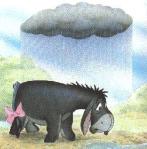 Eric Wilson is one of the comfortably-gloomy Gusses, the grumpy young men, leading a backlash against Positive Psychology. Here he is, participating in a round-table discussion of our right to remain grumpy… reviewed by Garrison Keillor… & on NPR.
Eric Wilson is one of the comfortably-gloomy Gusses, the grumpy young men, leading a backlash against Positive Psychology. Here he is, participating in a round-table discussion of our right to remain grumpy… reviewed by Garrison Keillor… & on NPR.
The last page of his book is illuminating: he acknowledges friends and family and thanks them for tolerating his lifelong Eeyore-hood.  His parents have been “especially patient with my chronic gloom,” his wife has shown “remarkable endurance of my melancholy moods,” but his five-year old daughter has “consistently brightened my heart and made life worth living.”
His parents have been “especially patient with my chronic gloom,” his wife has shown “remarkable endurance of my melancholy moods,” but his five-year old daughter has “consistently brightened my heart and made life worth living.”
Clearly, depressives take a toll on those they love (and probably feel bad about it), and they cast their impressionable young in a shadow of gloom we must all hope they’ll retain the strength and resources and genetic potential to avoid falling into themselves, when the spontaneous brightness of childhood dims.
A question: can pessimistic parents raise optimistic children? Should they try? You know the answer you’ll get to that, from Positive Psychologists like Martin Seligman and others. (Seligman at TED)
Apparently maternal depression is a harder handicap for children to rebound from than despondent Daddys, so Eric needn’t feel as guilty as he should with the other chromosome set. But if (as Prof. Levy said… as Marty Seligman said in fact, in The Optimistic Child) we really want future generations to understand more of the human condition, and want our children to be happy, we’d better start modeling that for them occasionally. If you’re inveterately (but not uncontrollably) morose, don’t you still owe it to your kids to rouse yourself to a semblance of enjoyment at least once in a while? Nurture’s not all, but neither is it negligible.
My mother was diagnosed with what was then called manic-depressive illness early in my childhood. I didn’t understand why she had to live apart from us for long stretches of time, in a cold and cavernous institution that was (but yet wasn’t, somehow) like the hospitals I’d known as patient and visitor, when Mom was still relatively healthy and working as an R.N. Nor did I understand what “electro-shock therapy” meant. Then, when she came home, I didn’t understand why she wore a blank, emotionless expression and couldn’t remember or muster interest in, or enthusiasm for, much of anything at all.
My father, I learned eventually, despite his own challenging childhood, was blessed with a spontaneously-sunny, optimistic disposition that had been clouded through much of my youth by the sad shadow of my mother’s affliction. I didn’t see much of it then. I wasn’t a happy kid, or college student. It would be years until I discovered James’s discovery of Renouvier, and began to think that my own pursuit of happiness was something it might be worth looking into. As my bumper sticker proclaims, falsely in many situations no doubt, but gratefully in my own: It’s Never Too Late to Have a Happy Childhood.
In his own teenage wasteland, Wilson says, “I longed most to spend my days, especially in summer, lolling about in my dark bedroom. With my blinds dimming the morning sun to a gloomy beam, I would lie on my floor and stare at the stains on my ceiling [with] a tremulous air of failure… embracing blackness while the world sprang into light. I loved my cold seclusion… this winter of my mind’s own making.”
And then his Dad would barge in, raise the blinds, and encourage him to go play ball or swim or call a girl. What a spoilsport.
Most of us grow out of that particular form of adolescent self-indulgence, if we’ve been cursed by it. The mature Wilson is right: “those committed to happiness at any cost and those bent on sadness no matter what are not very different… happy types, bent only on bliss, always take flight [from ambiguity]. But those who have committed their lives to dejection are no different. These sad types– those black-clad poseurs who identify only with the darkness– choose sullenness as one picks a religion or a haircut… They too live only partial existences.”
Good of him to admit that, and to encourage his little daughter to live in the light. If she ever finds herself thrown by life into the gloom of a real shadow, this attitude is probably not going to work for her. Hope she reads Rapt.
Tags: "Crimes & Misdemeanors, Eric Wilson, Garrison Keillor, Martin Seligman, Woody Allen
Leave a comment